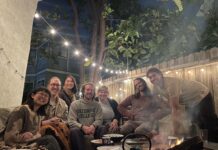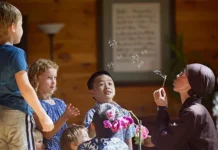
- This event has passed.
Farming for the Future
We get to choose.
– Thich Nhat Hanh
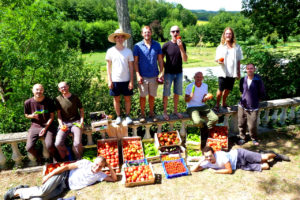
Join us for a Panel Sharing and Q&A with 6 Wake Up friends who are involved in sustainable agriculture. We will explore the connection between meditation and growing carrots, between putting food on the table and the 5 Mindfulness Trainings, and between cultivating the soil and the insight of Interbeing.
* Br. Tenzin (Mountain Spring Monastery)
* Br. Will (FOLO Farms, Wake Up Singapore, Joyful Garden Sangha)
* Sr. Hang (Nui Tuong, PV Thailand, Compassionate Ocean Sangha)
* Br. Mick (Upper Hamlet Happy Farm, Leaves of One Tree Sangha Belfast, Plum Village Ireland)
* Sr. Julie (Lower Hamlet Happy Farm)
* Br. Jazz (Sadhana Forest, Wake Up International & Wake Up Belgium)

Timing
* 7-8.30am UTC
* 7-8.30am UK
* 8-9.30am CET (Paris, Brussels…)
* 9-10.30am Israel
* 1.30-3pm India
* 2-3.30pm Vietnam, Thailand, Indonesia
* 3-3.30pm Malaysia, Singapore, Taiwan and Hong Kong
* 6-7.30pm AEDT (Melbourne, Sydney…)
* 11pm-0.30am PT (Los Angeles…)
Sign up to stay up to date
but the cultivation and perfection of human beings.
– Masanobu Fukuoka
—
About the panelists
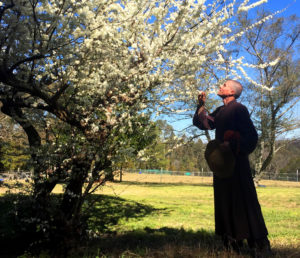 Brother Tenzin discovered natural farming in the pages of Fukuoka’s “one straw revolution” while in high school, causing some dismay by attempting to convert the family garden into a food forest. A career in ecology, specialising in the impacts of climate change in biodiversity, led to much time for quiet reflection in the rainforests of northern Australia, but a visit to Plum Village in France germinated the aspiration to help build sustainable spiritual community, and the monastic path as a means to devote more time to practice of mindful living. Ordained as a monk in the Mahayana tradition, Tenzin currently lives in the Blue mountains near Sydney, Australia, where he is helping to build “Mountain Spring” a practice centre in the the Plum Village tradition, including a syntropic farm.
Brother Tenzin discovered natural farming in the pages of Fukuoka’s “one straw revolution” while in high school, causing some dismay by attempting to convert the family garden into a food forest. A career in ecology, specialising in the impacts of climate change in biodiversity, led to much time for quiet reflection in the rainforests of northern Australia, but a visit to Plum Village in France germinated the aspiration to help build sustainable spiritual community, and the monastic path as a means to devote more time to practice of mindful living. Ordained as a monk in the Mahayana tradition, Tenzin currently lives in the Blue mountains near Sydney, Australia, where he is helping to build “Mountain Spring” a practice centre in the the Plum Village tradition, including a syntropic farm.
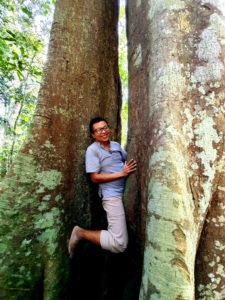 Br. Will Chua (Crossing to The Other Shore of the Heart) experienced composting for the first time, at the Plum Village Happy Farm, during the 2014 21-day retreat. He went home to Malaysia to co-found FOLO, ‘Feed Our Loved Ones’. FOLO is a community farm that collects and composts 3 tons of food waste every day to grow food for his community. FOLO was founded on the principles of the Four Nutriments, and inspired by Thay’s teaching, “No Mud, No Lotus.” His learning journey continues, and he is now an aspiring agro-forester. Will practices with Wake Up Singapore and Singapore’s Joyful Garden Sangha.
Br. Will Chua (Crossing to The Other Shore of the Heart) experienced composting for the first time, at the Plum Village Happy Farm, during the 2014 21-day retreat. He went home to Malaysia to co-found FOLO, ‘Feed Our Loved Ones’. FOLO is a community farm that collects and composts 3 tons of food waste every day to grow food for his community. FOLO was founded on the principles of the Four Nutriments, and inspired by Thay’s teaching, “No Mud, No Lotus.” His learning journey continues, and he is now an aspiring agro-forester. Will practices with Wake Up Singapore and Singapore’s Joyful Garden Sangha.
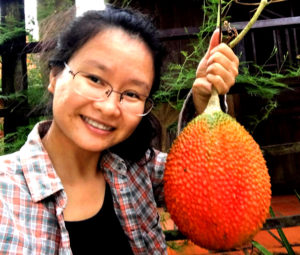 Sr. Hang Le, is founder and manager of Nui Tuong, an organic farming project in southern Vietnam that offers local children free education and vocational training. The garden is a model for kids and local farmers to discover ways to build a flourishing farm without harmful chemicals. In Nui Tuong they practice mindfulness meditation, gratitude and sharing. Many of the children come from broken families and are in need of mental and emotional support. Besides that, Nui Tong offer them soft skills like leadership, communication, business, critical thinking, music and art. Hang practices with Plum Village Thailand and the Compassionate Ocean Sangha.
Sr. Hang Le, is founder and manager of Nui Tuong, an organic farming project in southern Vietnam that offers local children free education and vocational training. The garden is a model for kids and local farmers to discover ways to build a flourishing farm without harmful chemicals. In Nui Tuong they practice mindfulness meditation, gratitude and sharing. Many of the children come from broken families and are in need of mental and emotional support. Besides that, Nui Tong offer them soft skills like leadership, communication, business, critical thinking, music and art. Hang practices with Plum Village Thailand and the Compassionate Ocean Sangha.
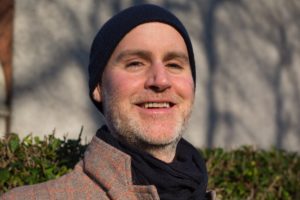 Br. Mick McEvoy is the Manager of the Plum Village Happy Farm in Upper Hamlet since 2016. Mick has a 20 year career in horticulture, ecology and agriculture beginning in Ireland and the UK and which has taken him all over the world. Mick put his roots down in the soil of the Plum Village tradition after Thay and the Sangha visited Ireland in 2012. He co-founded the Leaves of One Tree Sangha in Belfast and still supports the Irish Sangha from France as the Chair person of the Plum Village Irish Charity Mindfulness Ireland.
Br. Mick McEvoy is the Manager of the Plum Village Happy Farm in Upper Hamlet since 2016. Mick has a 20 year career in horticulture, ecology and agriculture beginning in Ireland and the UK and which has taken him all over the world. Mick put his roots down in the soil of the Plum Village tradition after Thay and the Sangha visited Ireland in 2012. He co-founded the Leaves of One Tree Sangha in Belfast and still supports the Irish Sangha from France as the Chair person of the Plum Village Irish Charity Mindfulness Ireland.
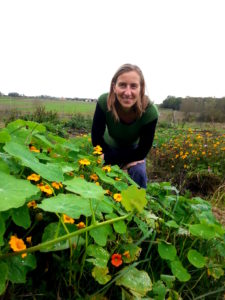 Sr. Andrea Schlueter ‘accidentally’ visited the Intersein centre while touring different ecovillages in Germany in 2012 and discovered Thay’s teachings. She lived as a lay sister in Plum Village from the end of 2014 to 2018. This experience changed her way of looking at life and being in the world. After volunteering in the Upper Hamlet Happy Farm she helped establish the Happy Farm in Lower Hamlet in 2016.
Sr. Andrea Schlueter ‘accidentally’ visited the Intersein centre while touring different ecovillages in Germany in 2012 and discovered Thay’s teachings. She lived as a lay sister in Plum Village from the end of 2014 to 2018. This experience changed her way of looking at life and being in the world. After volunteering in the Upper Hamlet Happy Farm she helped establish the Happy Farm in Lower Hamlet in 2016. 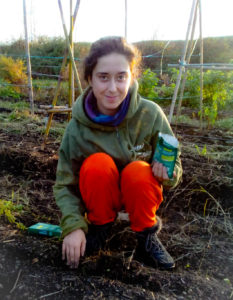
—
Choosing what to eat
By Thich Nhat Hanh (from: How to Eat)
Our way of eating and producing food can be very violent, to other species, to our own bodies, and to the Earth. Or our way of growing, distributing, and eating food can be part of creating a larger healing. We get to choose. The planet suffers deeply because of the way many of us eat now. Forests are razed to grow grain to feed livestock, and the way the animals are raised pollutes our water and air. A lot of grain and water is also used to make alcohol. Tens of thousands of children die of starvation and malnutrition every day, even though our Earth has the ability to feed us all. With each meal, we make choices that help or harm the planet. “What shall I eat today?” is a very deep question. You might want to ask yourself that question every morning. You may find that as you practice mindful eating and begin to look deeply at what you eat and drink, your desire for certain foods may change. Your happiness and that of the Earth are intertwined.

